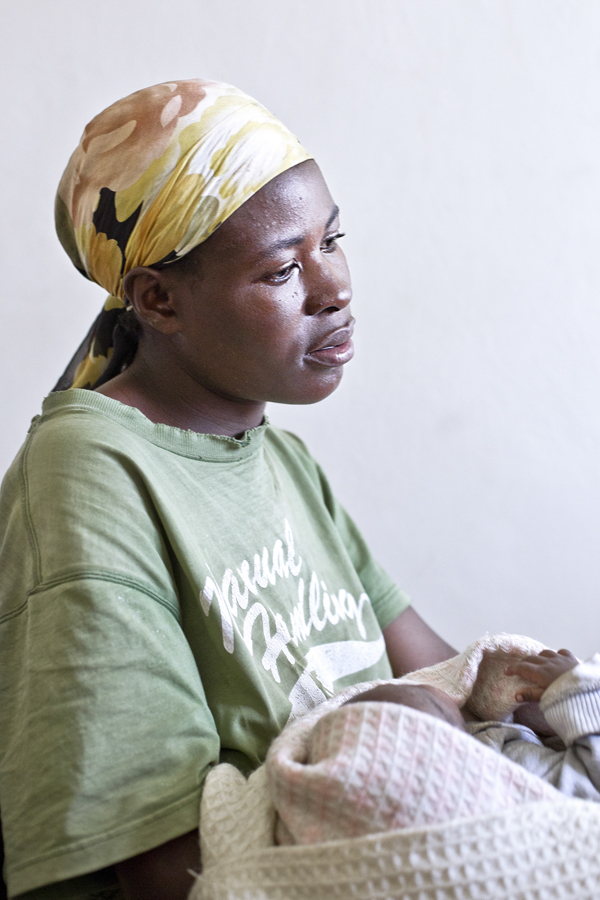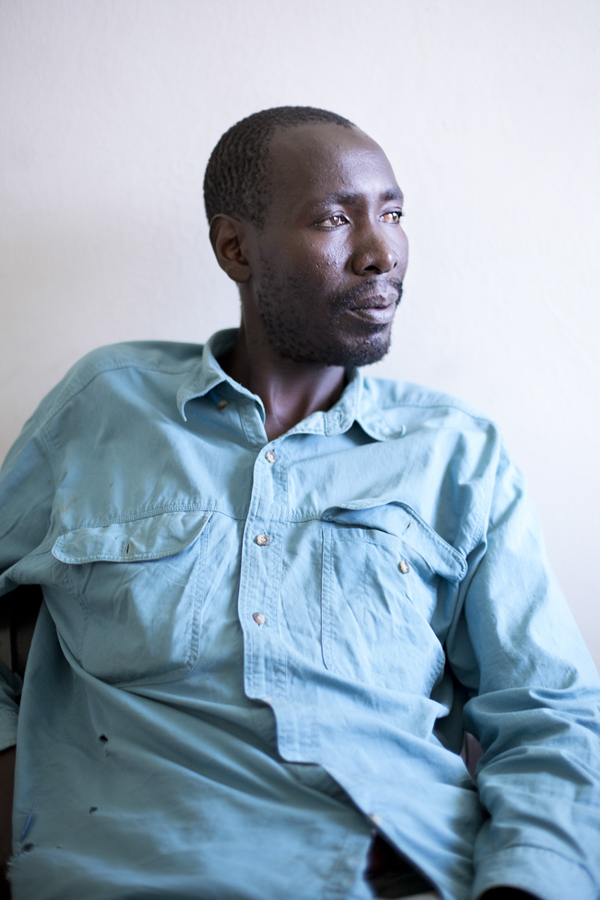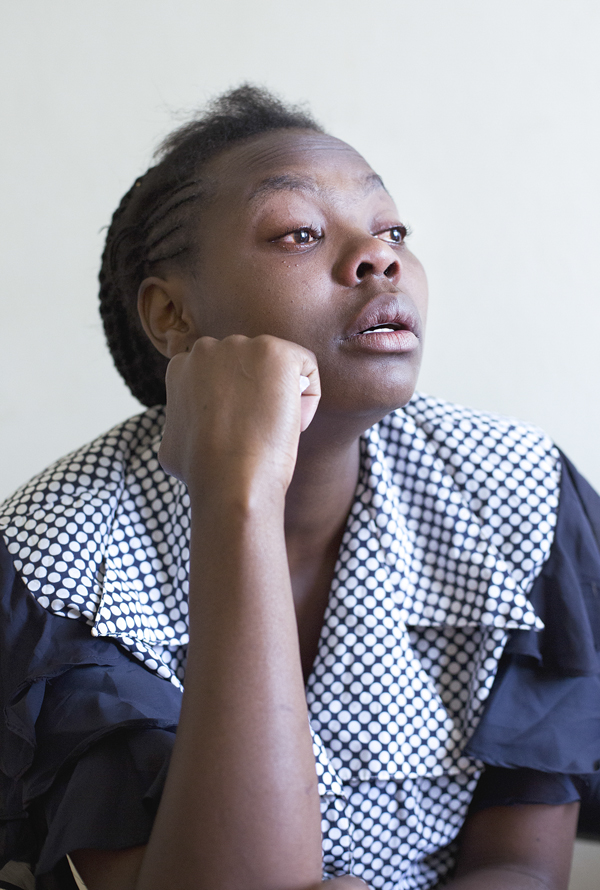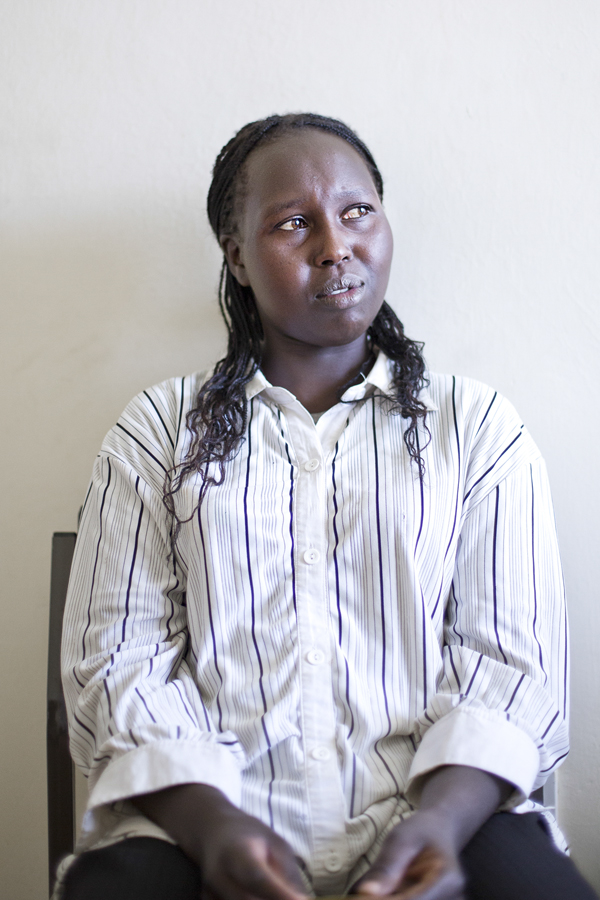
15 minutes
by Zuzana and Daniel
Dr. Helen Wnjiku of the St. Ladislav clinic in Eldoret, Kenya receives daily about 14 patients who come in for HIV tests. She takes a drop of blood from their finger and mixes it with a test solution. They remain completely silent until Dr. Helen sits down with each patient and prepares them for the test results. 15 minutes. The answer to one of the most important questions of people’s lives in Sub-Saharan Africa comes in 15 minutes.
Today 34 million people are HIV positive. 1.7 million died of AIDS in 2011. Although Kenya is the political and economic leader in East Africa, 9% of its population is HIV positive.
by Zuzana and Daniel
Dr. Helen Wnjiku of the St. Ladislav clinic in Eldoret, Kenya receives daily about 14 patients who come in for HIV tests. She takes a drop of blood from their finger and mixes it with a test solution. They remain completely silent until Dr. Helen sits down with each patient and prepares them for the test results. 15 minutes. The answer to one of the most important questions of people’s lives in Sub-Saharan Africa comes in 15 minutes.
Today 34 million people are HIV positive. 1.7 million died of AIDS in 2011. Although Kenya is the political and economic leader in East Africa, 9% of its population is HIV positive.


Rukia
Rukia was attacked and raped by five men on her way from work. “I came home without money and half naked. I didn’t stop bleeding for two weeks.” When Rukia realized she was pregnant, she tried abortion twice. Both times were unsuccessful. “I even thought of selling the baby. Now, I can’t find work and have no food for my other two kids”.
Every 30 minutes a woman is raped in Kenya; that’s almost 15,000 rapes each year. A quarter of women age 12 to 24 lose their virginity by force. Many get pregnant or are infected with HIV. Abortions are illegal and performed at home in unsanitary conditions. As a result, 3,000 women die after home abortions and another 21,000 are hospitalized and face prosecution.
Rukia was attacked and raped by five men on her way from work. “I came home without money and half naked. I didn’t stop bleeding for two weeks.” When Rukia realized she was pregnant, she tried abortion twice. Both times were unsuccessful. “I even thought of selling the baby. Now, I can’t find work and have no food for my other two kids”.
Every 30 minutes a woman is raped in Kenya; that’s almost 15,000 rapes each year. A quarter of women age 12 to 24 lose their virginity by force. Many get pregnant or are infected with HIV. Abortions are illegal and performed at home in unsanitary conditions. As a result, 3,000 women die after home abortions and another 21,000 are hospitalized and face prosecution.


Amanda
Amanda is 26 and has two kids. Like many other women from the Eldoret slums, she gets tested out of concern with her husband’s repetitive infidelity. He is a cross-country bus driver and doesn’t come home for weeks. Amanda is unemployed and depends on her husband’s support. She has undergone HIV testing three times and all came with negative results.
HIV rates are twice as high for women than men in Kenya. Women age 15 to 24 are four times more likely to contract HIV infection than men. This is the highest infection rate in all of Africa. Marriage at a young age, frequent rapes, female circumcision, and dangerous home abortions contribute to the problem. Kenyans believe that women are originators of the infection and so many women fear getting tested or sharing their results with families. A positive test result would mean social ostracism and home violence.
Amanda is 26 and has two kids. Like many other women from the Eldoret slums, she gets tested out of concern with her husband’s repetitive infidelity. He is a cross-country bus driver and doesn’t come home for weeks. Amanda is unemployed and depends on her husband’s support. She has undergone HIV testing three times and all came with negative results.
HIV rates are twice as high for women than men in Kenya. Women age 15 to 24 are four times more likely to contract HIV infection than men. This is the highest infection rate in all of Africa. Marriage at a young age, frequent rapes, female circumcision, and dangerous home abortions contribute to the problem. Kenyans believe that women are originators of the infection and so many women fear getting tested or sharing their results with families. A positive test result would mean social ostracism and home violence.


Kimani
“Yes, I have had many sexual partners. I have three kids with my wife and three outside of my marriage. I’ve suspected having HIV, but never really wanted to know for sure. Why bother?” Kimani (39) came to see the doctor because he hasn‘t been feeling well lately. He no longer has the strength to work; he can hardly walk. The test results confirm his suspicion and Dr. Helen will shortly inform him about the ART treatment available to him.
Most people don’t want to know their HIV status because being positive comes with a great stigma in Kenya. The Antiretroviral Therapy (ART) is the only way to continue a fairly normal life. Once started, patients cannot miss a single dosage. The therapy must also be accompanied by a nutritionally balanced diet, otherwise the patient could collapse. This is why many HIV positive patients don’t trust ART and rather subscribe to myths. Perhaps the most absurd myth is that having sex with a virgin could cure an HIV positive man.
“Yes, I have had many sexual partners. I have three kids with my wife and three outside of my marriage. I’ve suspected having HIV, but never really wanted to know for sure. Why bother?” Kimani (39) came to see the doctor because he hasn‘t been feeling well lately. He no longer has the strength to work; he can hardly walk. The test results confirm his suspicion and Dr. Helen will shortly inform him about the ART treatment available to him.
Most people don’t want to know their HIV status because being positive comes with a great stigma in Kenya. The Antiretroviral Therapy (ART) is the only way to continue a fairly normal life. Once started, patients cannot miss a single dosage. The therapy must also be accompanied by a nutritionally balanced diet, otherwise the patient could collapse. This is why many HIV positive patients don’t trust ART and rather subscribe to myths. Perhaps the most absurd myth is that having sex with a virgin could cure an HIV positive man.


Margaret
Margaret’s husband left the family and no longer supports them. So the 23 year-old mother makes money with occasional prostitution, of course without protection. “Taxi drivers pay the most, neighbours are the cheapest. Sometimes I’ve even done it for a box of rice.” Since HIV tests are free at this Clinic, Margaret comes in every three months. “What will I do if I find out I’m positive? I don’t know...”
The high prostitution rates reflect the extreme poverty among Kenyans. Prices for sex run around 1 to 3 Euros. Prostitution is especially high in Kenya’s popular tourist destinations. In those regions, 30% of teenagers between 12 and 18 sell their bodies to make ends meet. It is no surprise that prostitution accelerates the spread of HIV. A third of women gets inflected after having unprotected sex with strangers.
Margaret’s husband left the family and no longer supports them. So the 23 year-old mother makes money with occasional prostitution, of course without protection. “Taxi drivers pay the most, neighbours are the cheapest. Sometimes I’ve even done it for a box of rice.” Since HIV tests are free at this Clinic, Margaret comes in every three months. “What will I do if I find out I’m positive? I don’t know...”
The high prostitution rates reflect the extreme poverty among Kenyans. Prices for sex run around 1 to 3 Euros. Prostitution is especially high in Kenya’s popular tourist destinations. In those regions, 30% of teenagers between 12 and 18 sell their bodies to make ends meet. It is no surprise that prostitution accelerates the spread of HIV. A third of women gets inflected after having unprotected sex with strangers.


Mary
Mary got recently married and is now five months pregnant. She is only 19 and comes in to the Clinic for regular check-ups, which also include an HIV test. When the test comes back positive, she is shocked and bursts into tears. Dr. Helen tells her that if she starts the medication immediately, the baby may still be okay.
According to World Health Organization, around 1,000 HIV positive babies are born every day. Mother-to-child transmission during pregnancy, birth, and breastfeeding together represent an alarming 15 % of HIV infections. Nowadays the chance of a new born getting infected can significantly decrease if the mother starts treatment by the 28th week of pregnancy. The first dose of ART alone can increase the success rate by 50 %.
Mary got recently married and is now five months pregnant. She is only 19 and comes in to the Clinic for regular check-ups, which also include an HIV test. When the test comes back positive, she is shocked and bursts into tears. Dr. Helen tells her that if she starts the medication immediately, the baby may still be okay.
According to World Health Organization, around 1,000 HIV positive babies are born every day. Mother-to-child transmission during pregnancy, birth, and breastfeeding together represent an alarming 15 % of HIV infections. Nowadays the chance of a new born getting infected can significantly decrease if the mother starts treatment by the 28th week of pregnancy. The first dose of ART alone can increase the success rate by 50 %.


Joyce
Joyce (44) hasn’t been feeling well lately. She feels weak and coughs a lot. Her physician just completed routine examinations and sent her here right away. “Sometimes I cough without being able to breathe. It has been like this for quite some time. I’m frightened what will happen to my kids.”
Many HIV positive people first get tested when their immune system is already weakened, a state that many “opportunistic infections”, such as tuberculosis and pneumonia, take advantage of. Presence of opportunistic infections often results in death. The number of people suffering from the combination of HIV/AIDS and tuberculosis has tripled between 1990 and 2010 in Kenya. The prognosis for these patients is 10 times worst than patients with tuberculosis alone. Pneumonia has also spread with the increase of HIV in the 1980s. Today a quarter of HIV positive children succumb to this disease.
Joyce (44) hasn’t been feeling well lately. She feels weak and coughs a lot. Her physician just completed routine examinations and sent her here right away. “Sometimes I cough without being able to breathe. It has been like this for quite some time. I’m frightened what will happen to my kids.”
Many HIV positive people first get tested when their immune system is already weakened, a state that many “opportunistic infections”, such as tuberculosis and pneumonia, take advantage of. Presence of opportunistic infections often results in death. The number of people suffering from the combination of HIV/AIDS and tuberculosis has tripled between 1990 and 2010 in Kenya. The prognosis for these patients is 10 times worst than patients with tuberculosis alone. Pneumonia has also spread with the increase of HIV in the 1980s. Today a quarter of HIV positive children succumb to this disease.


Nyarouth
Nyarouth (33) lives in a polygamous relationship. Her husband takes care of their two children and four more children from his first wife. “I was happy with him. He would divide his time between the two families. He always took good care of the children. Lately though, I have heard rumours that he sees other women outside the town.”
Polygamy has a strong tradition in Kenya and will soon be legalized. At least 13 out of 100 women state that they share their husband with other women. Polygamy contributes to the spread of the HIV virus, infecting twice as many marriages as is the case with monogamous relationships. The Kenyan tradition of “widow inheritance” is commonplace. When a husband dies, his brother or another male relative takes on all matrimonial duties. Since deaths are often caused by HIV/AIDS, this tradition contributes to more infections in the population.
Nyarouth (33) lives in a polygamous relationship. Her husband takes care of their two children and four more children from his first wife. “I was happy with him. He would divide his time between the two families. He always took good care of the children. Lately though, I have heard rumours that he sees other women outside the town.”
Polygamy has a strong tradition in Kenya and will soon be legalized. At least 13 out of 100 women state that they share their husband with other women. Polygamy contributes to the spread of the HIV virus, infecting twice as many marriages as is the case with monogamous relationships. The Kenyan tradition of “widow inheritance” is commonplace. When a husband dies, his brother or another male relative takes on all matrimonial duties. Since deaths are often caused by HIV/AIDS, this tradition contributes to more infections in the population.

